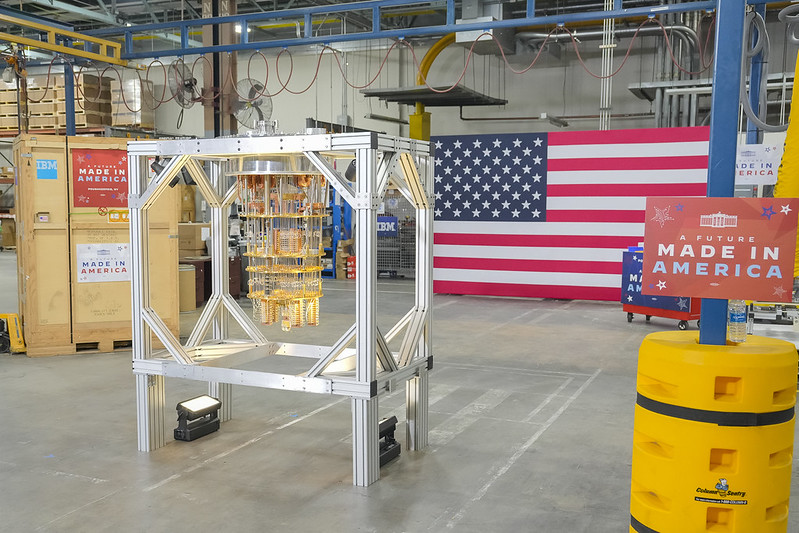
President Joe Biden observes the the IBM System One quantum computer during a tour of the IBM facility in Poughkeepsie, New York, Thursday, October 6, 2022. (Official White House Photo by Adam Schultz)
In Foreign Policy, Rishi Iyengar explains the quantum future of computing, and what it means for geopolitics, writing:
Even as the U.S. government tries to hold back China’s semiconductor industry and steal a march on its artificial intelligence capabilities, it is also preparing a much bigger, and more important, battlefield: quantum computing.
Mentions of the technology have been tucked into a recent executive order curbing outbound investment into China, guardrails around funding for the CHIPS and Science Act, and a pair of presidential directives last year aimed at securing America’s own quantum capabilities.
For everything from encryption to combat communications, winning the quantum war means winning the bigger war. And this battle has just begun.
“For the U.S. and our allies, not getting it first has profound implications,” said Rick Switzer, director of strategy and policy at the State Department’s Office of the Special Envoy for Technology, at the Quantum World Congress in Virginia last week.
Just what is quantum computing?
The computers we use today operate on a binary system composed of units known as bits, which can hold a value of 0 or 1. They have a switch, like a light, on or off. Quantum computers are different.
Imagine if Schrödinger’s cat were a programmer—or rather, the program. Quantum computing is neither one thing nor the other. Regular computers work on an assembly-line basis—brisk, in many cases—but still Henry Ford style. Quantum computers would allow controlled anarchy into the shop: Instead of an assembly line, you’d have an exponential assembly cloud.
“Quantum computers are basically strings of qubits, quantum bits,” said Olivia Lanes, the global lead for quantum advocacy at IBM. “When you string these together and you entangle them so basically all of the qubits can talk to one another, the computational power of that processor grows exponentially, as opposed to linearly like it would for our classical computer.”
Quantum computers can perform complex functions simultaneously and could potentially solve problems that are out of reach of even the most advanced supercomputers of today. Drug discovery, advanced manufacturing, climate change modeling, and other applications could all be supercharged by quantum-enabled computing. Quantum computing will do to traditional computing what Einstein did to Newton. Even if it goes into weird places.
“Eventually, it would help to solve for something that you wouldn’t expect,” said Kristin Gilkes, who leads the global quantum computing lab at the consulting firm EY and whose team is working on quantum applications for DNA sequencing. “Today, 2 plus 2 is 4. In a quantum environment, it’s going to have the probability of being pink.”
Read more here.
